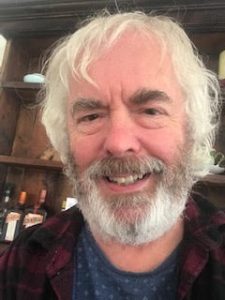By Michael Cains.
Sometime after four he turned the large screen television off. His wife was curled up in her corner of the sofa, gently snoring. He had to repeatedly press the remote’s off button to make the depressing picture go away. Batteries probably flattened by continually surfing TV stations to witness the unfolding disaster, watching a defeat become a rout. The radio was playing music in the next room – the ABC had wound up its over-enthusiastic coverage a while back.
He cradled his head in his hands, sighing a deep breath.
‘Where did we go wrong?’ to no-one in particular. His mobile phone quietly rang. It hadn’t stopped since he’d left the party function. Someone was going to tell him why. Again. Its battery would need charging soon.
‘Yes’, he answered tersely after checking the name on the screen.
‘No. I haven’t a clue. You will have to ask her.’
He listened to the caller rabbiting on, not really paying attention. He just wanted to go to sleep.
‘I know we had a five percent margin. I know the polls predicted we would hold.’
‘Of course we did. You just cannot predict … It happened everywhere.’ The caller became irate and dangerously demanding. He let them say their piece.
‘No, I haven’t decided what I’m going to do yet. I’ll make some calls in the morning.’
They were almost deriding. As if it was all his fault. Everyone starting to distance themselves from everyone else.
‘Yes. He called. Just after we got home.’
They were almost yelling down the line now.
‘I had to concede. There was no way I could do otherwise.’ More angry questions.
‘No. We’re meeting at eleven on Monday to go over the campaign. No point today is there?’ He paused to give himself time to think how to answer their next question.
‘Yes, I’m still here.’ They asked it again, phrasing it differently.
‘I haven’t decided yet. Too early.’ His phone bleeped. Another incoming call from the media. He didn’t want to answer it but it gave a good excuse to finish the present conversation. If you could call it a conversation.
‘I have to go. Talk tomorrow.’ He pressed the phone’s red button and switched it to silent. The Channel Ten number flashed up on the screen again. That idiot from The Project probably wanting a quote for their next airing. He ignored the call, flinging it onto the antique coffee table. Katie stirred, stretching out tanned arms.
‘Cold?’ he asked. ‘I turned the heating off.’
‘No. I’m all right.’ She eyed him coolly and he wondered what she was thinking. Was she blaming him like the rest? He couldn’t tell. She tottered away on sleepy legs to check on their daughter. Her Siamese cat followed. It was never far away.
His sleep deprived mind was still churning over the carousel ride of the last few weeks. His scotch standing untouched. He couldn’t remember the last time he’d had a proper nights sleep. He couldn’t remember the last time he’d had received any affection from Katie. He couldn’t remember the last time he’d received any affection from anyone, for that matter. It had all been questions. Hundreds of them. Aggressive ones from journalists always looking to trip him up. From constituents with their personal agendas, impossible requests to lock in their support. Their votes.
The life he had chosen had been mapped out years ago. The blue-eyed lawyer at twenty-one. Quick on his feet, a reputation for making difficult decisions, and for caring. He didn’t really care but the reputation served the goal, and that goal was power. To be in Government, in a ministry if he was in the right faction. He didn’t even know what that faction was any more. There would be massive change. Many so-called friends would be thinking the same as him. About themselves.
It was a savage game. He knew that. There would be time to rethink options in the days to come, and whether he wanted to be a part of the inevitable rebuilding. The people had spoken. Oh sure, they had always been kind to his face telling him what he wanted to hear. Maybe they were as frightened of him as he was of them. He had been told he had ‘presence’ but maybe that scared people a little. Or a lot. So they didn’t vote for him. Theories, theories, but who really knows?
He had always thought he knew what they wanted, or what was best for them. So many issues had to be boiled down into a palatable soup of simple messages and slogans. To get everyone on the same page agreeing with him what was best, and that he was ‘The Man’ to get things done. He had been until now.
His daughter appeared bleary-eyed at the oak door with its inlaid stained-glass panels. She ran across the room, flinging herself onto his lap. Katie hovered behind.
‘She was awake. All the noise when we got home, I suppose.’ The babysitter, Katie’s sister, had left a while ago.
As his daughter snuggled into his neck he thought about how quickly she had grown, and how little she had meant to him in the pursuit of power, living more in Canberra than here. How they talked on the phone until running out of things to say, which was never long. He wondered what she really thought of the stranger she called Daddy. A ‘Spend More Time with My Family’ speech started forming in his head, but deep down he knew that usual excuse would never suffice for him. He lived for the high-wire balancing, the intrigues, the brutal knifings, those late-night Canberra dinners soaked with expensive wines. He knew he would have to find a way back there.
Thinking slowed but his tired mind was still sharp. Thoughts always came easiest late at night before exhaustion won out. He reflected on what could have happened, on what should have happened. He thought about his own image in the media and the party room, about his ‘presence.’ It was one of his pet sayings that sometimes it is better to say what they want to hear; he thought he had been so very good at that. Now he wondered if that were the case. Sitting in semi-darkness with his daughter on his lap, and his wife leaning against the door frame, smiling, a revelation hit him from a part of his mind he usually ignored. The weaker part, he usually called it.
‘What they want to hear means you have to listen first.’ He mused on that. He had always convinced them, putting words into their mouths. Now they had spoken back emphatically, and for the first time in his political career he was forced to pay attention. They hadn’t listened to him because he hadn’t said what they wanted to hear. He didn’t even know what he wanted to hear himself. Words were just a way to get what he wanted; they had no real meaning. Now he was nowhere, and wilderness or obscurity beckoned.
ABOUT THE AUTHOR
Michael escaped regular employment two years ago, and when not renovating or travelling anywhere with his wife in their Avan campervan, he writes. He never really stopped this since school, receiving frowns for his creative responses to staid organisational communication before finding a niche as a part-time motorsport journalist for fifteen years. He leans towards Speculative Fiction, but will try anything, rediscovering a latent love of poetry and short stories. A novel or three are in progress.



Guenter Sahr
I enjoyed the perspective you applied to the story. The subjective narrative almost got me to see & appreciate the inner life of a representative of Lib losers. Almost, I say, but to yet for I’m still savouring my schadenfreude.
Michael
Thanks Guenter. I tried to stay neutral and “get inside” a losing candidate. I might keep it until next time!
Michael Cains
If I had read this article before I wrote this piece in the Conversation it might have turned out somewhat differently. Maybe not.
https://theconversation.com/everything-has-gone-a-world-first-study-looks-at-what-happens-when-mps-lose-their-seats-184452?utm_medium=Social&utm_source=Facebook&fbclid=IwAR1v1D1lCB5mPxzFc3_tKCjLehZjIdpaFaXt2vLuPKPP078P1OQfBdufCu0&fs=e&s=cl#Echobox=1655154868